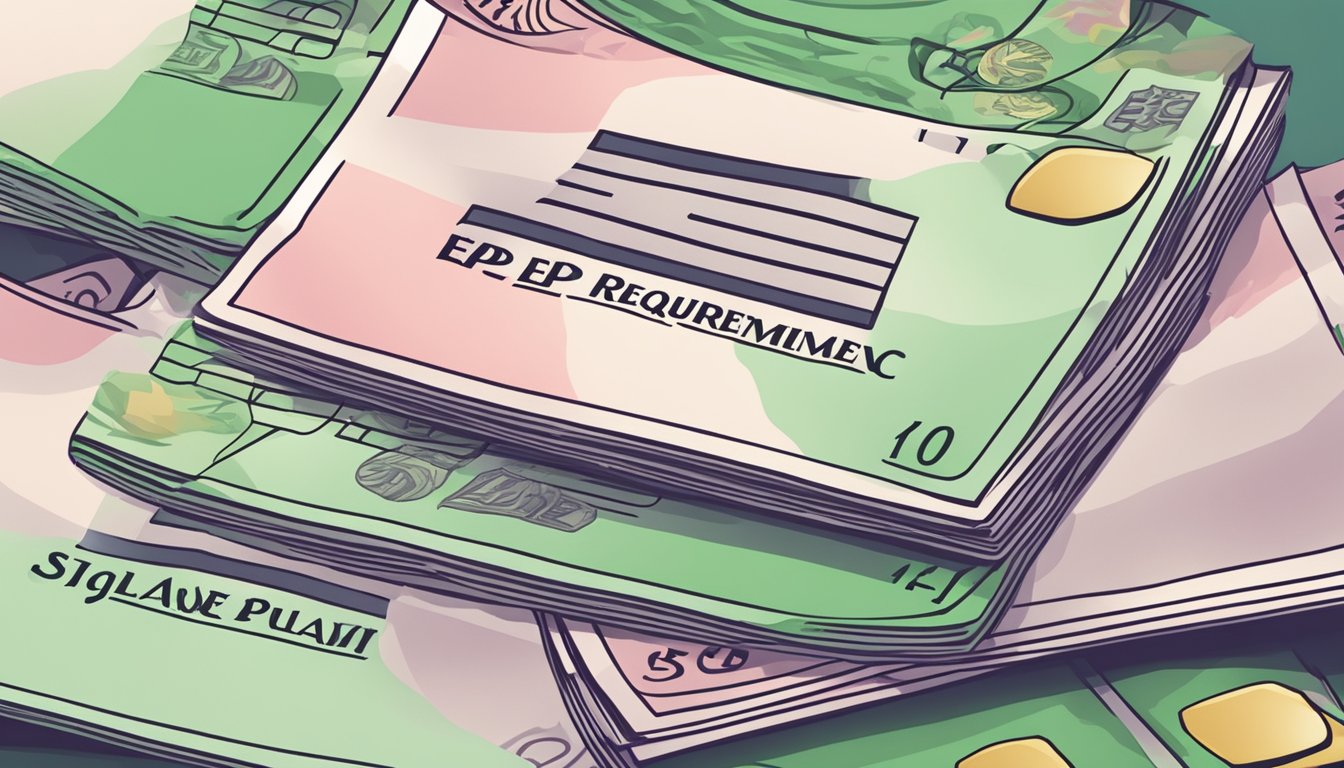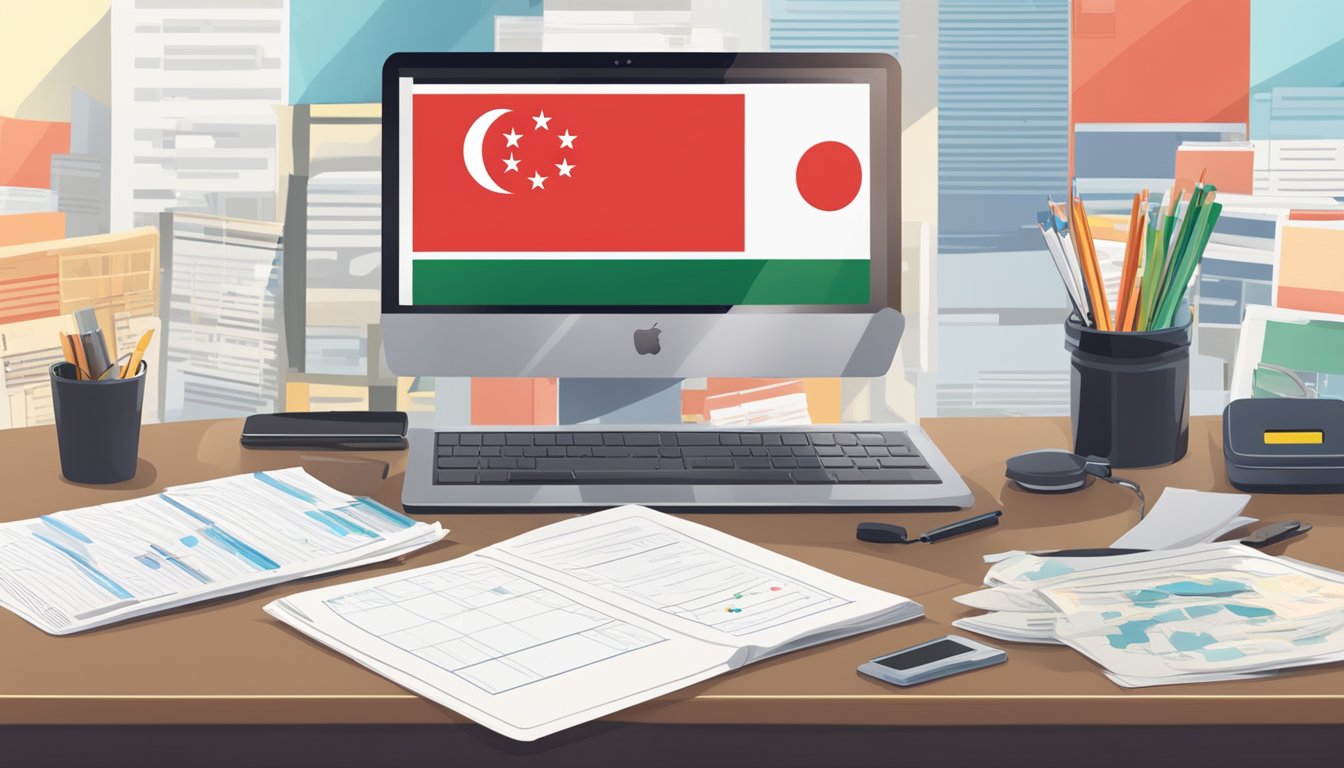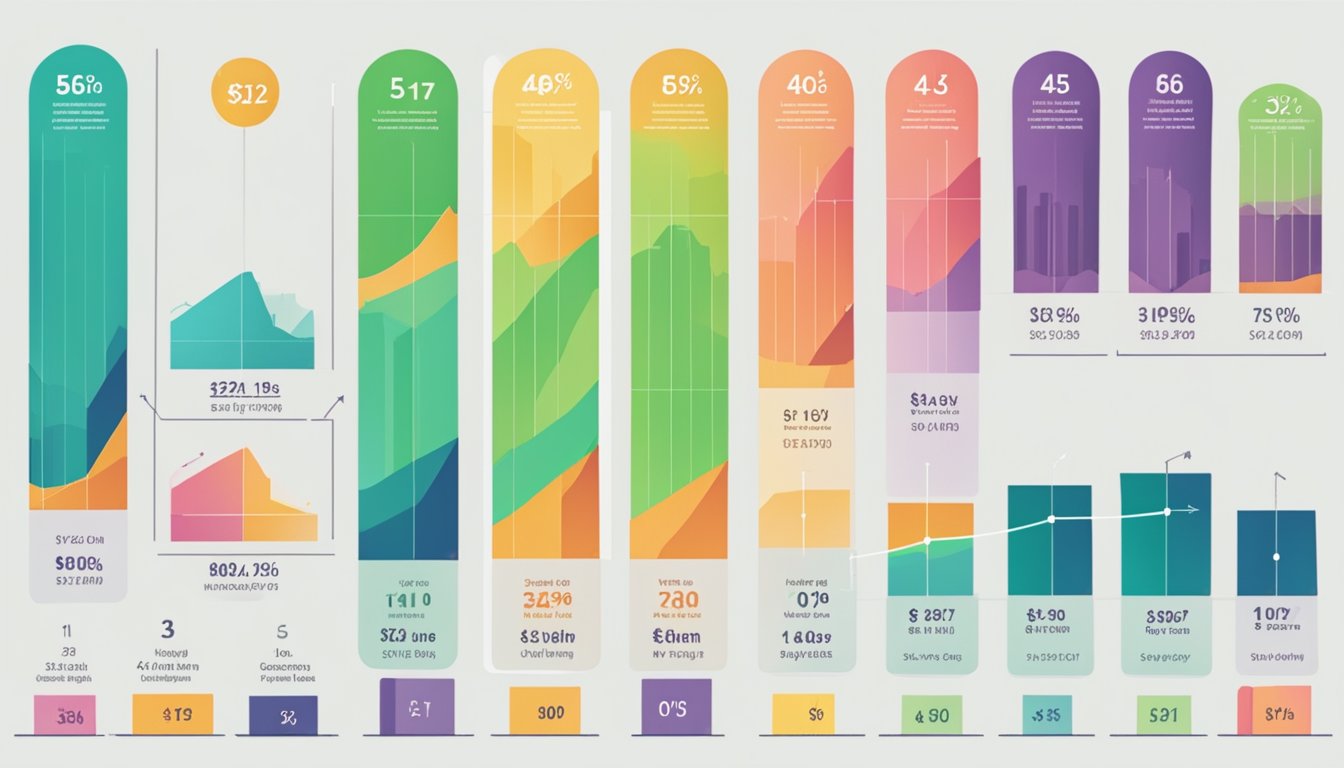Introduction:

If you are a foreign professional looking to work in Singapore, you will need to obtain an Employment Pass (EP). The EP is a work visa that allows you to work and live in Singapore, but it comes with certain requirements. One of the most important requirements is the EP salary requirement.
Understanding Employment Pass Eligibility:
To be eligible for an EP, you must meet certain criteria, including the EP salary requirement. The salary requirement is reviewed annually and is based on various factors such as economic conditions, industry trends, and local workforce profiles. Currently, the EP salary requirement is at least $4,500 per month, but it varies depending on your qualifications and experience.
The Application Process for Professionals:
To apply for an EP, you will need to submit an online application through the Ministry of Manpower (MOM) website. You will also need to provide supporting documents such as your educational certificates, work experience, and a copy of your passport. Once your application is approved, you will need to complete the formalities such as getting your EP issued and registering for a Singaporean tax number.
Key Takeaways
- The EP salary requirement is an important eligibility criterion for foreign professionals looking to work in Singapore.
- The EP salary requirement is reviewed annually and varies depending on factors such as economic conditions and industry trends.
- To apply for an EP, you will need to submit an online application through the MOM website and provide supporting documents such as your educational certificates and work experience.
Understanding Employment Pass Eligibility

If you are a foreign professional wanting to work in Singapore, you will need to obtain an Employment Pass (EP). This pass allows you to work and live in Singapore for a period of time. However, to be eligible for an EP, you must meet certain criteria.
Eligibility Criteria for EP Holders
To be eligible for an EP, you must possess the necessary qualifications, skills, and experience that are relevant to the job you are applying for. You must also have a job offer from a Singapore-based employer.
In addition, you must meet the minimum qualifying salary requirements set by the Ministry of Manpower (MOM). The minimum salary requirement varies depending on your age and the sector you work in.
Minimum Qualifying Salary Requirements
The minimum qualifying salary requirement for EP holders is $5,500 for the financial services sector. For other sectors, the minimum qualifying salary requirement is $5,000. However, this salary requirement increases progressively with age, up to $11,500 for individuals aged 45 and above.
It is important to note that the minimum qualifying salary requirement applies to both new and renewal EP applications. If you are renewing your EP, you must meet the minimum salary requirement at the time of renewal.
The MOM periodically reviews and updates the minimum qualifying salary requirements for EP holders. It is important to stay updated on these requirements to ensure that you are eligible for an EP.
In summary, to be eligible for an EP in Singapore, you must possess the necessary qualifications, skills, and experience, have a job offer from a Singapore-based employer, and meet the minimum qualifying salary requirements set by the MOM.
The Application Process for Professionals

If you are a foreign professional looking to work in Singapore, you will need to apply for an Employment Pass (EP). The EP is a work visa that allows foreign professionals, managers and executives to work in Singapore. To apply for an EP, you will need to meet certain requirements, including the minimum salary requirement.
Steps to Apply for an EP
To apply for an EP, follow these steps:
-
Check your eligibility: Before you apply for an EP, make sure you meet the eligibility criteria. You must be a foreign professional with at least a bachelor’s degree and relevant work experience. You must also have a valid job offer from a Singapore-based company, and your salary must meet the minimum salary requirement of at least $5,000 per month.
-
Submit your application: You can submit your EP application online through the Ministry of Manpower’s EP Online portal. Make sure you have all the required documents, such as your passport, educational certificates, and employment contract.
-
Wait for the outcome: The processing time for EP applications is usually around three weeks. You can check the status of your application online using the EP Online portal.
-
Collect your EP: If your application is approved, you will need to collect your EP in person at the Ministry of Manpower. You will need to bring your passport and any other documents that were requested during the application process.
Renewal Applications Insights
If you already have an EP and need to renew it, you can do so online through the EP Online portal. Renewal applications are usually processed within seven working days. However, if there are any issues with your application, such as incomplete documentation or a change in your employment status, the processing time may be longer.
It is important to note that the EP qualifying salary requirements for renewal applications are the same as for new applications. From 1 September 2023, the minimum salary requirement for EP renewals is at least $5,000 per month for all sectors except financial services. The salary requirement increases progressively with age from age 23, up to $10,500 at age 45 and above.
In conclusion, the application process for an EP in Singapore is straightforward, but it is important to make sure you meet the eligibility criteria and have all the required documents before you apply. Renewal applications are also straightforward, but make sure you meet the minimum salary requirement to avoid any issues with your application.
Salary Trends and Benchmarks in Singapore

If you are considering working in Singapore, it is important to understand the salary trends and benchmarks in the country. This section will provide an overview of local PMET salaries and expatriate salary expectations.
Local PMET Salaries Overview
In Singapore, the Ministry of Manpower has established salary benchmarks for local PMETs. According to the current benchmarks, the required salary for 10 points (65th percentile of local PMETs) is $5,155 a month, while the required salary for 20 points (90th percentile of local PMETs) is $7,704 a month. These benchmarks vary based on age, with the required salary for 10 points ranging from $4,888 a month for those under 23 to $7,810 a month for those over 28.
It is important to note that these benchmarks are not legally binding, and employers may choose to offer salaries above or below these benchmarks. However, the benchmarks can provide a useful reference point for employees and job seekers when negotiating salaries.
Expatriate Salary Expectations
For expatriates working in Singapore, salary expectations can vary widely depending on factors such as industry, experience, and qualifications. However, it is generally expected that expatriate salaries will be higher than local PMET salaries.
According to a survey by Mercer, the average expatriate salary in Singapore was $223,095 a year in 2020. This is significantly higher than the salary benchmarks for local PMETs, which range from $5,155 to $7,810 a month.
It is also worth noting that expatriate salaries in Singapore may be subject to additional benefits and allowances, such as housing allowances, education allowances, and relocation expenses. These benefits can significantly increase the overall compensation package for expatriates.
Overall, understanding the salary trends and benchmarks in Singapore can help you negotiate a fair salary and make informed decisions about your career. Whether you are a local PMET or an expatriate, it is important to do your research and understand the market conditions in your industry.
Complementarity in the Singapore Workforce

If you’re looking to work in Singapore, you may be wondering about the eligibility requirements for an Employment Pass (EP). One of the key criteria for an EP is the salary requirement. However, there are other factors that are taken into consideration as well. Singapore’s Ministry of Manpower (MOM) has implemented a Complementarity Assessment Framework (COMPASS) to evaluate EP applications more comprehensively.
Complementarity and Diversity Assessment
COMPASS is a two-stage assessment framework that evaluates the complementarity and diversity of the EP candidate to the local workforce. The framework assesses the candidate’s salary, qualifications, diversity, support for local employment, skills bonus, and strategic economic priorities bonus.
Under the C1. Salary criteria, the candidate’s fixed monthly salary needs to meet or exceed the 65th percentile of local PMET salaries in your sector. EP candidates earning at least $22,500 in fixed monthly salary are exempted from COMPASS.
Supporting Local Employment
The MOM places a strong emphasis on supporting local employment. If your company has a strong track record of hiring and developing local talent, this will be viewed favourably by the MOM. In addition, if your company is involved in initiatives that support the local workforce, such as training programmes or job fairs, this will also be taken into consideration.
In summary, when applying for an EP in Singapore, it’s important to not only meet the salary requirements but also to demonstrate your complementarity and diversity to the local workforce. By supporting local employment, you can increase your chances of a successful EP application.
Future Developments and Economic Priorities

As Singapore continues to strengthen its economy, the government is committed to promoting innovation and internationalisation, while also adapting to global competition. These priorities will shape the future of the country and have an impact on the Employment Pass (EP) salary requirements.
Innovation and Internationalisation
Singapore is investing heavily in research and development to drive innovation in key sectors such as technology and biomedicine. This investment is aimed at creating new jobs and attracting foreign talent to work in Singapore. As a result, the EP salary requirements may be adjusted to reflect the changing demands of the economy.
In addition, the government is encouraging internationalisation by promoting trade and investment with other countries. This is aimed at creating new opportunities for businesses and increasing the demand for skilled workers. As a result, the EP salary requirements may be adjusted to ensure that Singapore remains an attractive destination for foreign talent.
Adapting to Global Competition
Singapore is facing increasing competition from other countries in the region and around the world. To remain competitive, the government is focused on developing a highly skilled workforce that can meet the demands of the global economy. This includes attracting foreign talent to work in Singapore and investing in education and training programmes.
To support this goal, the EP salary requirements may be adjusted to ensure that Singapore remains an attractive destination for foreign talent. This will help to maintain the country’s position as a leading business hub in the region and around the world.
Overall, the future of Singapore’s economy is bright, with a strong focus on innovation, internationalisation, and adapting to global competition. As these priorities continue to shape the country’s economic landscape, the EP salary requirements may be adjusted to reflect the changing demands of the economy and ensure that Singapore remains an attractive destination for foreign talent.
Frequently Asked Questions

What’s the latest minimum salary requirement for an Employment Pass in 2024?
As of 2024, the minimum salary requirement for an Employment Pass (EP) in Singapore is $4,500. This is applicable to all EP applicants regardless of age, sector, or nationality. The Ministry of Manpower (MOM) has set this as the minimum salary to ensure that foreign workers are paid fairly and to maintain a level playing field for all.
How has the qualifying salary for an EP changed this year?
The qualifying salary for an EP has not changed in 2024. However, it is worth noting that the qualifying salary has been raised gradually over the past few years. In 2021, the minimum qualifying salary for EP candidates in the Financial Services sector was raised to $5,000 for new applicants.
What are the exciting new rules affecting foreign workers in Singapore for 2023?
In 2023, the MOM is set to introduce new rules aimed at enhancing the protection of foreign workers in Singapore. The new rules will require employers to provide medical insurance coverage for all foreign workers, including those on EPs. The MOM will also require employers to pay a security deposit for each foreign worker they employ. These measures are aimed at ensuring that foreign workers in Singapore are treated fairly and are adequately protected.
Could you tell me if it’s become more challenging to secure an EP in Singapore recently?
It has become slightly more challenging to secure an EP in Singapore recently due to increased competition for jobs. The MOM has also tightened its criteria for granting EPs to ensure that only the most qualified candidates are given the opportunity to work in Singapore. However, if you meet the eligibility criteria and have the necessary skills and experience, you should not have any difficulty securing an EP.
Are there any updates to the Singapore EP points calculator for 2024?
There are no updates to the Singapore EP points calculator for 2024. The calculator is still used to determine an applicant’s eligibility for an EP based on factors such as salary, education, work experience, and age. The minimum qualifying salary of $4,500 still applies to all applicants.
What’s the buzz about Employment Pass rejection rates in Singapore?
The Employment Pass rejection rates in Singapore have been a topic of discussion among foreign workers and employers. While rejection rates have risen slightly in recent years, this is largely due to increased competition for jobs and the MOM’s efforts to ensure that only the most qualified candidates are granted EPs. If you meet the eligibility criteria and have the necessary skills and experience, you should not have any difficulty securing an EP.




